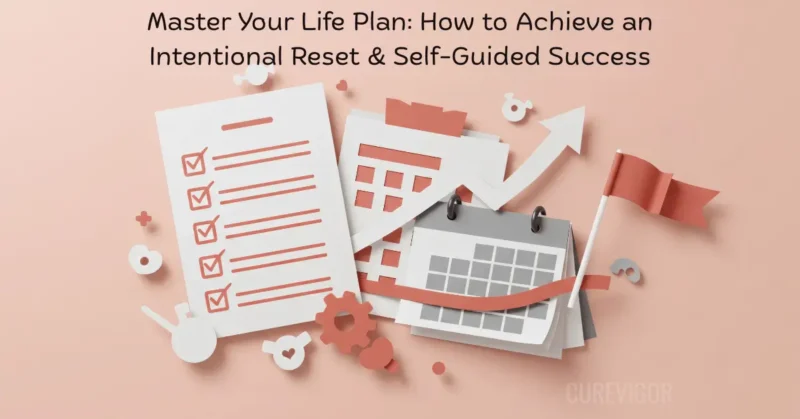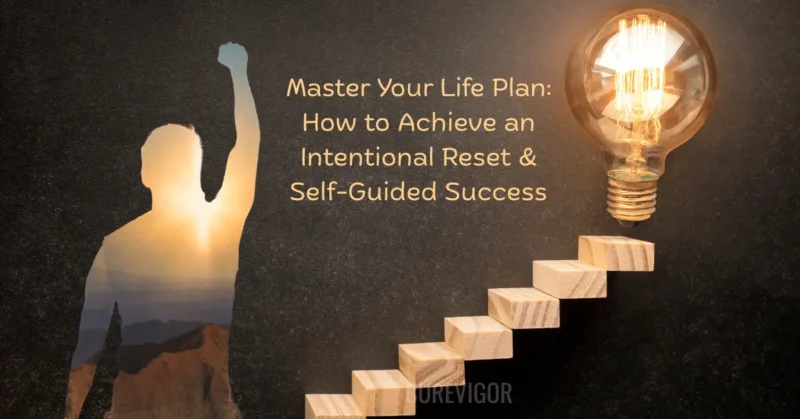Unlock clarity and confidence with a powerful life plan—your roadmap to self-guided success and an intentional reset. Discover how to design your future, set meaningful goals, and live with purpose every day.
Thank you for reading this post, don't forget to subscribe!How to Achieve an Intentional Reset & Self-Guided Success
In a world that constantly demands more of our time, energy, and attention, it’s easy to feel like life is happening to us rather than through us.
But what if you could take back control, design your days with purpose, and achieve success on your own terms?
That’s where a life plan comes in—a powerful tool for creating clarity, direction, and momentum.

Whether you’re seeking a fresh start, recovering from burnout, or simply craving more intentionality, this guide will walk you through how to master your life plan and unlock self-guided success through an intentional reset. Let’s dive in.
Life Plan Fundamentals
What Is a Life Plan?
A life plan is a written roadmap that outlines your goals, values, and priorities. It’s not just a list of dreams—it’s a strategic framework that helps you make decisions aligned with what truly matters.
Think of it as your personal GPS, guiding you through life’s twists and turns with clarity and confidence.
A well-crafted life plan includes:
- Your core values
- Long-term and short-term goals
- Key life domains (career, relationships, health, personal growth)
- Action steps and timelines
- Systems for tracking progress
Why Do You Need a Life Plan?
Without a life plan, it’s easy to drift—reacting to circumstances instead of creating them. A life plan helps you:
- Clarify your goals and define what success means to you.
- Prioritize your time around what matters most.
- Make intentional decisions that support your vision.
- Increase productivity by focusing on high-impact actions.
- Build resilience through structure and purpose.
In short, it’s your blueprint for self-guided success.

Identifying Your Values and Goals
Discovering Your Core Values
Your core values are the foundation of your life plan. They represent what’s most important to you—your non-negotiables, guiding principles, and sources of fulfillment.
To uncover your values, ask:
- What moments in life made me feel most alive?
- What do I stand for, even when it’s hard?
- What qualities do I admire in others?
- What would I fight to protect?
Common core values include:
- Integrity
- Freedom
- Creativity
- Connection
- Growth
- Service
Once identified, your values become the compass for every decision you make.
Setting SMART Goals
Goals without structure are just wishes. That’s why SMART goals are essential:
- Specific: Clearly define what you want
- Measurable: Track progress with metrics
- Achievable: Set realistic targets
- Relevant: Align with your values and life domains
- Time-bound: Set deadlines to stay accountable
Example: Instead of “Get healthy,” try “Walk 30 minutes daily, 5 days a week for the next 3 months.”
SMART goals turn your vision into actionable steps—fueling both productivity and motivation.

Creating a Life Plan That Works for You
Assessing Your Current Situation
Before you chart a new course, you need to know where you stand. Conduct a life audit across key domains:
- Career & Finances
- Health & Wellness
- Relationships
- Personal Growth
- Environment & Lifestyle
Rate each area on a scale of 1–10. Reflect on what’s working, what’s missing, and what needs attention. This clarity sets the stage for your intentional reset.
Setting Priorities
Not all goals are created equal. Use your values to prioritize:
- What goals align most with my core values?
- Which areas of life need urgent attention?
- What actions will create the biggest ripple effect?
Focus on 3–5 key goals at a time. This prevents overwhelm and builds momentum.
Creating an Action Plan
Now it’s time to move from vision to execution. Break each goal into:
- Milestones (monthly or quarterly)
- Weekly tasks
- Daily habits
Use tools like:
- Digital planners or apps (Notion, Trello, Todoist)
- Habit trackers
- Morning and evening routines
Consistency beats intensity. Small, daily actions compound into self-guided success.
Achieving an Intentional Reset
Letting Go of Limiting Beliefs
Your mindset shapes your reality. To reset your life, you must release beliefs that hold you back:
- “I’m not good enough.”
- “It’s too late to start over.”
- “Success is for other people.”
Challenge these thoughts with evidence, reframing, and affirmations. Replace “I can’t” with “I’m learning.”
Your life plan is not just about doing—it’s about becoming.
Cultivating a Growth Mentality
A growth mentality believes in the power of effort, welcomes challenges, and views failure as feedback. It’s the fuel for personal growth and resilience.
Ways to cultivate it:
- Read books that inspire (e.g., Mindset by Carol Dweck)
- Surround yourself with growth-oriented people.
- Reflect on lessons learned, not just outcomes.
- Celebrate effort, not perfection.
This mindset transforms obstacles into opportunities.
Practicing Self-Care
You can’t pour from an empty cup. Self-care is not indulgence—it’s maintenance for your mind, body, and soul.
Include:
- Physical care: sleep, movement, nutrition
- Emotional care: journaling, therapy, boundaries
- Spiritual care: meditation, nature, gratitude
Schedule self-care like any other priority. It’s the foundation of sustainable productivity and success.
Staying on Track

Tracking Your Progress
Progress builds confidence. Use systems to monitor your journey:
- Weekly reviews
- Monthly check-ins
- Life dashboards
Ask:
- What did I accomplish?
- What challenged me?
- What needs adjustment?
Tracking helps you stay aligned and adapt with intention.
Staying Accountable
Accountability accelerates success. Find support through:
- Mentors or coaches
- Accountability partners
- Online communities
- Public commitments (e.g., social media updates)
Share your goals and progress. Let others cheer you on and hold you to your vision.
Celebrating Your Successes
Do not celebrate when you cross the finish line. Celebrate each victory, no matter how small:
- Completed a milestone? Treat yourself.
- Stuck to a habit for 30 days? Reflect and reward.
- Overcame a fear? Journal the experience.
Celebration reinforces progress and keeps motivation high.
FAQs
Q. What Are the 7 Secrets to Success?
Success isn’t just about talent—it’s about mindset and strategy. The seven secrets include: clarity of purpose, consistent action, resilience in the face of setbacks, time mastery, continuous learning, strong relationships, and self-belief.
When you align your goals with your values and stay committed through ups and downs, success becomes inevitable. These principles apply whether you’re building a business, improving your health, or designing your ideal life. Success is a system, not a stroke of luck.
Q. How to Make a Successful Life Plan?
To create a successful life plan, start by identifying your core values—they’re your compass. Then define SMART goals that align with those values. Assess your current situation honestly, set priorities, and break goals into actionable steps.
Use tools like planners or dashboards to track progress. Most importantly, build in flexibility and reflection so your plan evolves with you. A life plan isn’t rigid—it’s a living guide to intentional success.
Q. How to Change Life in 7 Steps?
Transforming your life starts with awareness and intention. The seven steps are:
1) Reflect on what’s not working
2) Define your ideal future
3) Set clear goals
4) Let go of limiting beliefs
5) Build empowering habits
6) Surround yourself with supportive people, and
7) Take consistent action.
Each step builds momentum toward a life that feels aligned, purposeful, and fulfilling. Change isn’t instant—but it begins the moment you commit.
Q. What are the five Steps for Achieving Your Goals?
Achieving goals requires more than motivation—it needs structure. The five steps are: 1) Set SMART goals, 2) Break them into manageable tasks, 3) Create a timeline and routine, 4) Track progress regularly, and 5) Celebrate milestones.
These steps help you stay focused, overcome procrastination, and build confidence. This framework keeps you moving forward with clarity and purpose, regardless of your goals, whether they are greater health, career development, or personal improvement.
Q. What Is the 21/90 Rule?
The 21/90 rule is a powerful habit-building principle: it takes 21 days to form a habit and 90 days to make it a lifestyle. By committing to a new behavior for three weeks, you lay the foundation.
Continuing for three months embeds it into your identity. This rule is ideal for goals like fitness, productivity, or mindfulness. Pair it with tracking and accountability to turn short-term effort into long-term transformation.
Q. What Are the 7 P’s of Success?
The 7 P’s of success are a strategic framework: Purpose, Planning, Preparation, Persistence, Positivity, Performance, and Progress. Each “P” represents a pillar of intentional living.
Purpose gives direction, planning sets the course, preparation builds readiness, persistence fuels resilience, positivity shapes mindset, performance drives results, and progress keeps momentum.
Together, they form a holistic approach to achieving self-guided success in any area of life.
Final Thoughts: Design Your Life, Don’t Drift Through It
Creating a life plan is not a one-time event—it’s a lifestyle. It’s about choosing intention over reaction, clarity over chaos, and purpose over passivity.
By mastering your life plan, you unlock the power to:
- Reset your life with confidence.
- Achieve self-guided success on your terms.
- Live each day with meaning, momentum, and mindfulness.
You were never meant to drift. You were meant to design.
So take the first step. Reflect. Plan. Act. Reset. And rise.

Read more articles on Health and Balance.
You might like:


